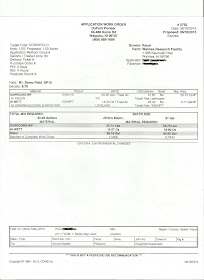Though it's often claimed that Kauai is the Islands' hellhole of agricultural pesticide use, state disclosure reports tell a very different
picture.
A total of 906,891 pounds of restricted
use pesticides were sold statewide in 2014. Hawaii County reported
total RUP sales of 138,632 pounds, Maui County 334,097 pounds and
Oahu 418,213 pounds, while Kauai reported just 15,949 pounds.
The total does not include RUPs applied
for structural pest control or termite treatment, because for some
odd reason, the anti-GMO and anti-ag groups have not called for
those companies to disclose their pesticide use.
The statewide sales report is in addition to the much more specific monthly RUP use reports that are voluntarily disclosed under the Kauai Agricultural Good Neighbor Program.
Chlorine, which is used to treat
drinking water and wastewater, accounted for 459,936 pounds of the
statewide total, or slightly more than half. Some 8,508 pounds of
chlorine were purchased on Kauai.
Statewide sales of chlorpyrifos were
reported at 7,279 pounds, with Kauai accounting for 1,300 pounds of
that total. As for atrazine, some 55,103 pounds were purchased
statewide last year, with Kauai accounting for 1,138 pounds of that
total. And Kauai accounted for just 856 pounds of the 15,706 pounds
of paraquat sold statewide.
In short, far fewer agricultural RUPs
are being bought, and ostensibly applied, on Kauai than any other
island. Yet it is here that folks are raising the loudest — and
still undocumented — claims of birth defects, asthma and cancer.
If ag pesticides actually are harming human health, wouldn't it make sense that the other islands, which have much
greater use, would be suffering proportionately more health problems
than Kauai? They also have people living in close proximity to
agriculture.
Or is it just that Kauai has been the
squeakiest wheel, in keeping with Vandana Shiva's exhortations that
the fight to rid the Islands of the seed companies must start here?
The statewide sales reports are
required under Act 105, a bill introduced by Kauai Rep. Dee Morikawai
that passed the Legislature in 2013.
The law also required the state
Legislative Reference Bureau to conduct a study of how other states
handle reporting requirements. Its findings:
After reviewing the laws and
regulations of other states, it appears that the majority of states
do not impose ANY reporting requirements on pesticides that do not
fall within the definition of a restricted use pesticide. Among the
seven states that address general use pesticides to any extent, there
is some variation as to whether the reporting requirements imposed by
a particular state apply to the sale, use, or both the sale and use
of general use pesticides. Further, there appears to be a great deal
of variation between the extent to which these reporting requirements
are applied and enforced from one state to another.
It should be noted that, in addition to
the fact that each of these states employs a different approach with
regard to reporting requirements, the Bureau could not find any sort
of comprehensive evaluation on the effectiveness of any of the
various reporting programs. Therefore, it is difficult to determine
whether and to what extent any of them have been successful in
achieving the objectives for which each program was established.
The Bureau was unable to secure
detailed information regarding the costs incurred by these states in
establishing and maintaining their various reporting programs.The
Bureau offers no conclusions regarding the budgetary requirements of
such programs, other than to note that, as discussed previously, both
Oregon and New York appear to have encountered difficulties resulting
from the cost of maintaining their reporting programs.
Oregon has subsequently abandoned the
implementation of its reporting program, due to high costs.









